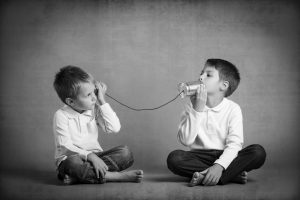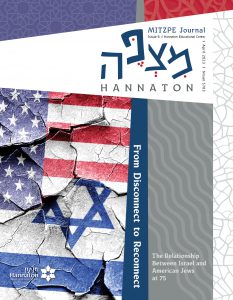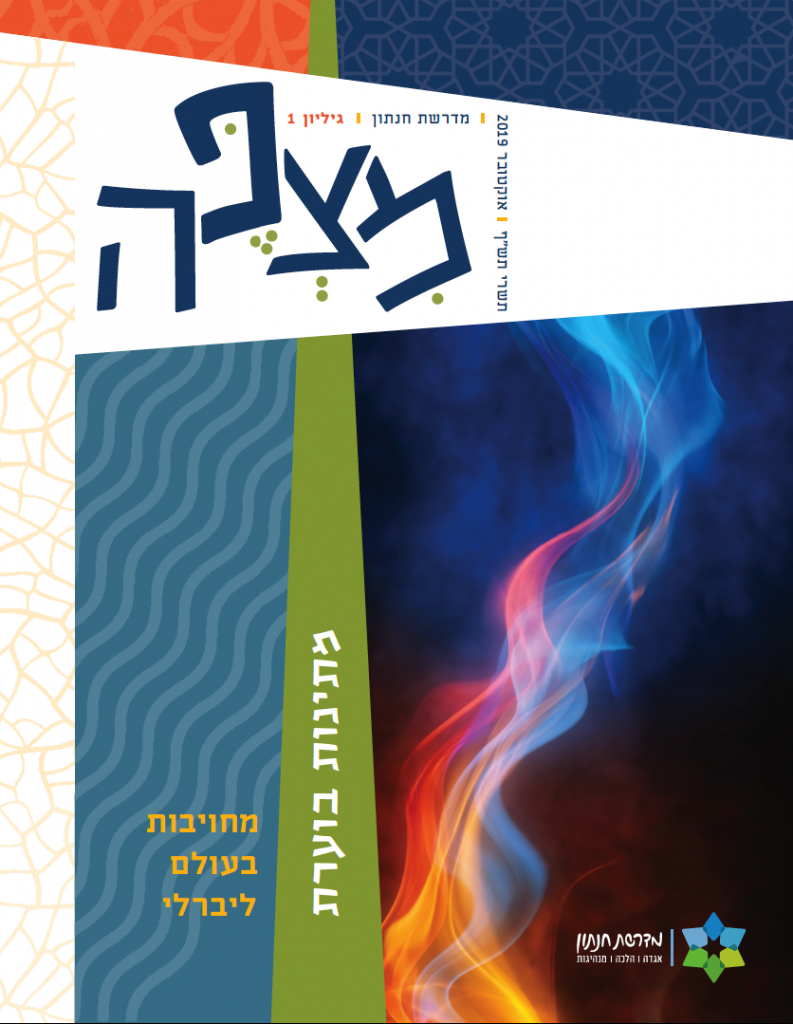Moderation is like a sweet memory in which I see myself drinking a cup of tea with an older person and talking about life. I hear the other person’s practical wisdom when he says that the current situation is not precisely either this or that; life is complicated; there are various aspects and diverse people, and one must behave wisely; that it is important to recognize dangerous trends, but self-examination must come first. What do I discern in this older person’s words? It is his modesty, as he is not attempting to tell me that he knows what should be done and that if he was in control everything would be different. It is modesty that is a virtue of the soul rather than some intellectual play on words extracted from a text studied; it is wisdom derived from a life lived and from the understanding that life is complex.
In Israel, which has not yet attained a fully formed identity, there are those who sense the responsibility that stems from “two thousand years” of history but they see the future in various hues—some see the destruction we have brought upon ourselves, others the destruction wrought upon us. Both are right, it is a time in which “darkness and light intermingle”—we are in the midst of the best era we have ever experienced, but we also appear to be striding along a path that can easily lead to calamity, and we are proceeding blindly as we cannot see what we are confronting. It is a society where all people experience themselves as being in the minority; all people feel threatened. But who in fact determines what is happening here? Right . . . the minority. Israel is a democratic Jewish state that contains within it a large minority of Arab citizens; some of the other citizens simply do not see them, while within that minority there are those who would prefer that we as Jews not be here at all. But it is necessary to remember that life is like that and people are like that too, so we must find a way to live with complexity—contain it, love it, without using it as an excuse for inaction.
I also hear some consolation in the words of my imaginary moderate interlocutor, consolation that conveys to me that life is not always easy, not to mention that we must not expect simplicity when addressing matters of society and state. But there is so much good here, so much beauty and charm, if we would only maintain the right proportions. Use your power to do good.
Well… it’s a pity that life is not all a cup of tea on the porch . . . Moderation . . . where are you, precious moderation? Why have you disappeared? And perhaps this is more a wish than a memory?
It may be argued that moderate people see the complexities, see two sides of almost every coin, see how ideologies are becoming radical, and in normal times they may be found somewhere in the middle. They think independently, and they are not necessarily loyal to a political party, rather voting by the changing circumstances.
It makes sense to think that the greater the radicalization the greater the proportion of moderates countering radicalization. But to our surprise we discover that what was radical yesterday is today considered acceptable and tolerable, and the moderates—where are they?
I would have liked to hope that the moderates would stand up for their beliefs and be clear about their principles, but they know very well that their truth is not the only one. God is “not in their pocket”; they are not concerned about being sufficiently accurate or completely authentic.
Moderate people grasp that the solutions to our complex situation are not always “obvious,” but even when what must be done at any given moment is not completely evident, they know for certain what is not acceptable and what must never be acceptable in a civilized society and in a Jewish and democratic state. They know that although it may not be possible to define justice, truth, benevolence, and so forth in any absolute way that is true everywhere and anytime and for all people in any given state, there is truth and there is benevolence and there is justice, and we must not only strive for them but rather we must cry out, fight, and refuse to accept injustice and wrongs within society as a fait accompli.
So where are they, these moderates? And why has no such movement of moderate people emerged? Perhaps because they prefer to drink tea on the porch rather than march in the streets? Moderation that is not urgent and burning is incapable of leading society forward; for that matter it is hardly even capable of leading itself.
Burning moderation—is this phrase conceivable? One word reflects a state of imbalance in nature, the other a balance—are they compatible? We certainly hope so. But regretfully, moderation is closer to clinical death than to a constantly burning fire.
Moderation that is not burning is incapable of generating a next generation; moderation is incapable of lighting the way; moderation is incapable of arousing the soul; moderation is incapable of forging people, families, communities, society, and state. So long as it is not burning, raging—it will not lead us, rather it will take us all down; because instead of being an essence that is based on clear ethics it will define itself only by the extreme. But the extreme is constantly shifting, and thus it is moderation that will allow the extreme to achieve consensus and the center to become radicalized.
Such moderation, whose only desire is to avoid conflict (whether by conceding some truth or as a form that overcomes the essence), comes into being by conceding; conceding aggadah that comes side by side with halakha, conceding thought that requires action. Such moderation is normally defined by contradiction—I’m neither religious nor secular, I’m neither right-wing nor left-wing, I’m neither nationalist nor post-Zionist, I’m neither in favor of trading land for peace nor of annexation, and so on. In Israel the UN is not greatly admired, but there are lots of UN advocates here, straddling the fence, talking for hours but saying nothing.
Moderation stands a chance only if it is not formed as a concession but rather derives from a decisive path; a firm and fundamental decision, and not merely a path, but rather a path that has a destination as well as a living, breathing, constant tension between values, a tension between worlds, a tension between lifestyles, a tension that reflects complexity. In order to maintain a state that is both Jewish and democratic, a Judaism with seventy facets, to embrace diversity and grow from it, to be part of the world and of the enlightened ideas it contains while also being connected to and creating from within Jewish tradition and its deepest concepts—we must be tightly stretched between the contrasting ends, courageously following our advocated values and goal. Only in this way will we be able to look back and see that we have formed a path of moderation, a middle path. Why a middle path? Because it leads to a sustainable future for us and for our children, because it leads to ideas that I believe are basic tenets that guide most of us, such as peace, a humane and tolerant society, environmental conservation, and so on.
But we have become resigned to a state of affairs where, although we know what we want, we accept with equanimity that realistic circumstances are completely at odds with our wishes, and we remain inactive as though this was predestined.
We all know that we must strive for a sustainable world, but global warming is increasing. We all know that peace is desirable, but despair of peace is spreading. We all know that disparities must be reduced, but in certain respects these are only growing . . . Can’t we see that something here is amiss?
Rav Kook wrote with regard to himself:
My greatest wish is to connect . . . all streams are within in me—faith and philosophy, nationalism and ethics, halakha and aggada, the revealed and the hidden, analysis and song. I must absorb everything. He who said that my soul is torn—spoke well. Of course it is torn. A man whose soul is not torn is unimaginable. Only the inanimate is whole, while man has contradictory inclinations, and always contains an inner struggle. And all of man’s work consists of uniting the torn pieces of his soul through a general idea, whose greatness and loftiness facilitate inclusion and harmony among everything. (Kook 1998, p. 111)
Moderation is a path, but it can be trodden only if you know where you wish to go or where you are not willing to go, what you are not willing to accept, and what are the values that guide you. In education we say that questions are the most important and the path you take is the most important. But if you are only capable of asking, without searching for answers; if you proceed along the path but don’t care where it will take you—you are probably headed in a direction that will take you nowhere.
The definitions of moderation—the middle path, the golden path—are intertwined, and each merits a large amount of writing and explanations. Some definitions discuss the virtues of the human soul or speak about the human body and how to live life in a balanced way that is not extreme; some provide guidelines on how a person can maintain equilibrium. See, for example, the words of Maimonides on how one should conduct himself—be neither a squanderer nor a miser, neither hot-tempered nor grumpy, neither violent nor cowardly, and so on—but this is a theory that pertains to the body rather than a social program.
People have written books about the middle path, providing analyses and wonderful diagnoses. But what do we do with this? Where does it lead? The diagnosis suddenly seems to us like a prognosis, and the prognosis as a type of solution for people who are in the middle and not at the extremes. But what do we do? “Let’s wait for the fog to lift.” “Be patient.” If that is our medium course, then when things improve and the fog lifts there will be nothing awaiting us: neither a mountain nor a revelation, only one big downward slope on which we will find ourselves, because we waited, dreamed, were deceived, and did nothing in the meantime, because “things will work out,” “have patience,” “the eternal nation does not fear a long journey,” there is still time, and so on. The eternal nation does not fear a long journey when it leads to war, but it seems to be terrified of peace.
That which is defined as extreme is constantly changing before our very eyes. In the past we demanded that our public representatives be truthful and not liars. Now, if you don’t lie you will be probably not be fit to serve as a public representative. Once, avarice was not an acceptable trait; today it is essential in order to attract attention, and there is no scarcity of examples. If the radicals are those who lead change (even if they are a minority, as the majority is always led by the minority) and the moderates merely want to seek the middle course, then we have a problem, as the moderates will seek compromise—“middle field.” They will resist conflict, certainly if it is acute and violent, in favor of non-combat, consensus, not too radical, being in the middle. But reality is not static. Reality shifts—it is constantly shifting—and at present in quite a few respects it is moving in gradually more radical directions . . . hence, a prime minister who has been indicted. Delegitimization of entire groups? Okay. Violent discourse? That’s just the way it is; and so on. Years ago, when Kahana gave a speech in the Knesset, the Likud party headed by Yitzhak Shamir all stood up and left the room, but today? Today his disciples are welcomed warmly and actively invited in. Should we be moderate with regard to racism, violence, hatred, war? With regard to losing our way and our identity? How about democracy?
In the absence of any clear ethical world and of a constant tension, we refrain from decrying wrongs, evil, the loss of our way. We avoid this because we are no longer certain what is unacceptable.
This is not a life of suffering or masochism, rather the exact opposite—harmony. Heraclitus, a pre-Socratic philosopher, argued that everything is in constant movement. We are familiar with his famous statement: “You cannot step into the same river twice.” Harmony is a result of contradictions within oft-changing reality. Heraclitus claimed that there is no constant order and connection but rather tension between contradictions. He used the example of a string that is pulled tightly in two different directions. If successful, it produces a sound and music is formed. But when the string is not taut and remains slack? Obviously, no sound is produced, no music, and this limpness has no chance of generating anything. Hence, he argued that for the world to exist there must be tension between contrasts; lacking tension there would be no world. No tension means no sound, no sound is no music, no creativity—only the shadow of what could have been.
A moderate person should proceed in the tension between the sacred and the profane, between innovation and tradition, between peace and security, between responsibility and dreams, between justice and compromise. But how can there be tension if we have no idea where we are headed? Tension is born of different directions and anchors, but if there is no anchor and no direction, if there is nothing to hold on to—how will we hold the string taut?
Moderation is not an a-priori view. Moderation is not a purpose but rather a means. It is not content but rather form.
The first mishnah in Pirkei Avot speaks of the three most important lessons learned at Mt. Sinai and passed along among the generations:
Moses received the Torah at Sinai and transmitted it to Joshua, Joshua to the elders, and the elders to the prophets, and the prophets to the Men of the Great Assembly. They said three things: Be moderate in justice, raise many disciples, and make a fence round the Torah. (m. Avot 1:1)
“Be moderate in justice.” This does not mean “be moderate when sentencing.” Some acts are unacceptable and some circumstances are unacceptable and cannot be ignored. Rather, be moderate in the path to justice. Don’t decide the truth in advance. Investigate different aspects. Listen. Understand that reality is complex. Apply discretion. Don’t act blindly simply because “it is written” or that the way things are done. Don’t be discouraged in advance. Rethink things. Don’t be afraid of criticism. Don’t deviate from the values that are your guiding principles.
Being moderate, being in the middle, not being radical, not appearing to be radical, is not a purpose; rather it is a path, a path that is measured by shifting reality, a path that contains both tension and harmony, a path that is not easily trodden—but is any other path possible if we desire life?
Israel is now at a junction—on one side is the desire for an honest “togetherness,” where e-v-e-r-y-o-n-e can sit around the table and build reality together, and on the other side, the need to consciously reach decisions and shape our future.
Burning moderation is moderation that is not compromising but instead, wise; not hesitant but instead, modest. It does not take shortcuts but instead expresses complex views. Only this type of moderation, one that is burning, is capable of leading, and only with it can we be together while at the same time bravely proceed towards the future that we desire.





